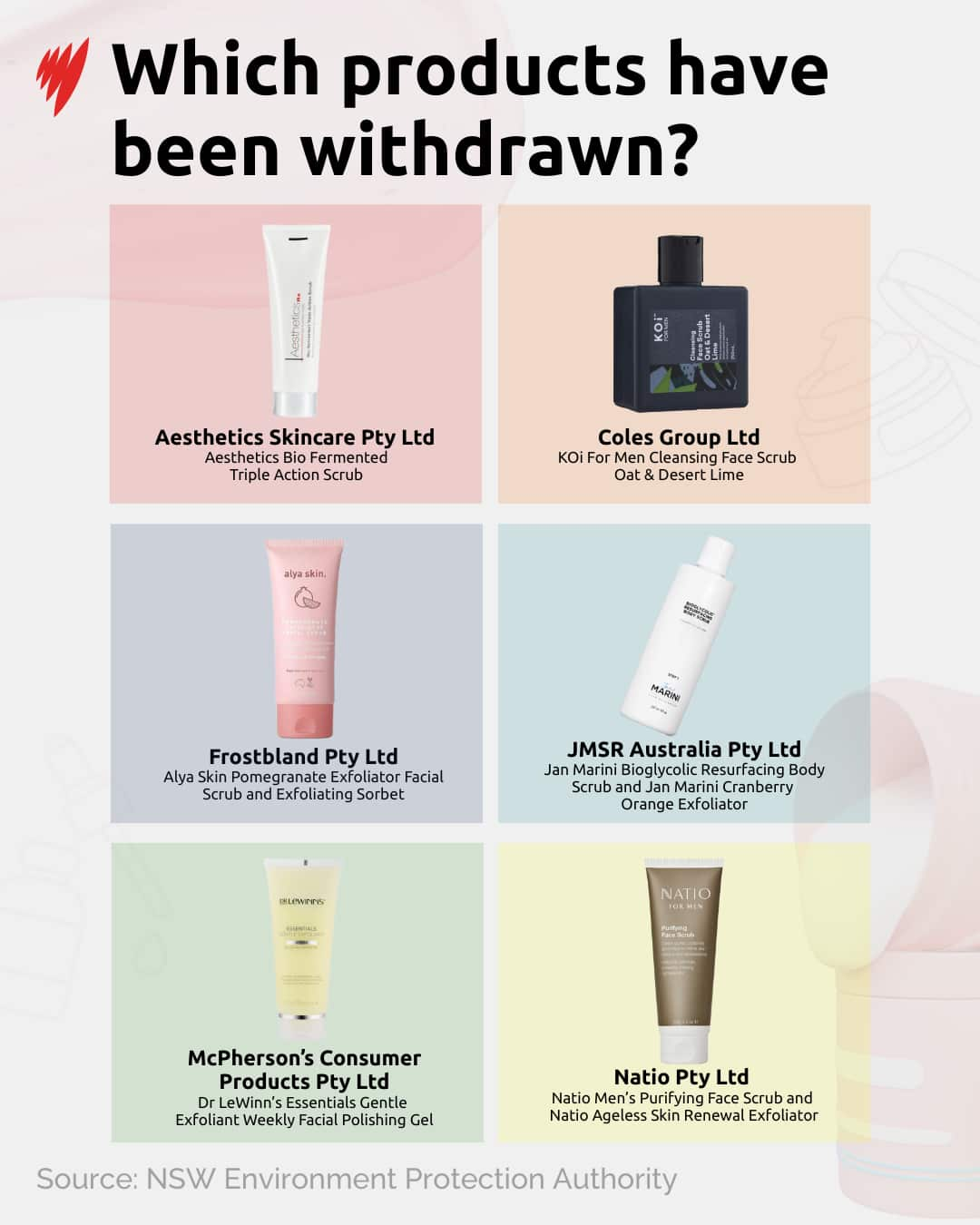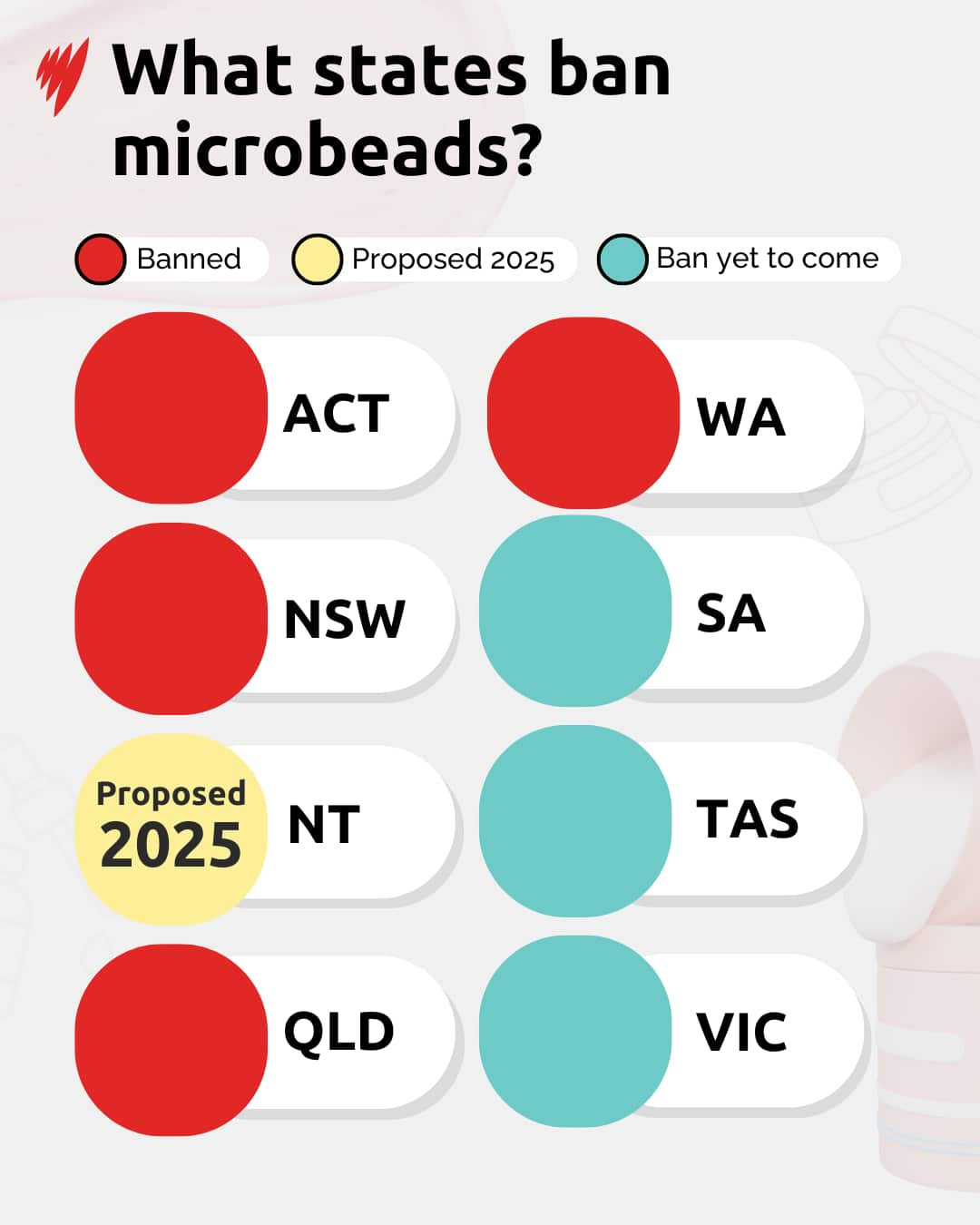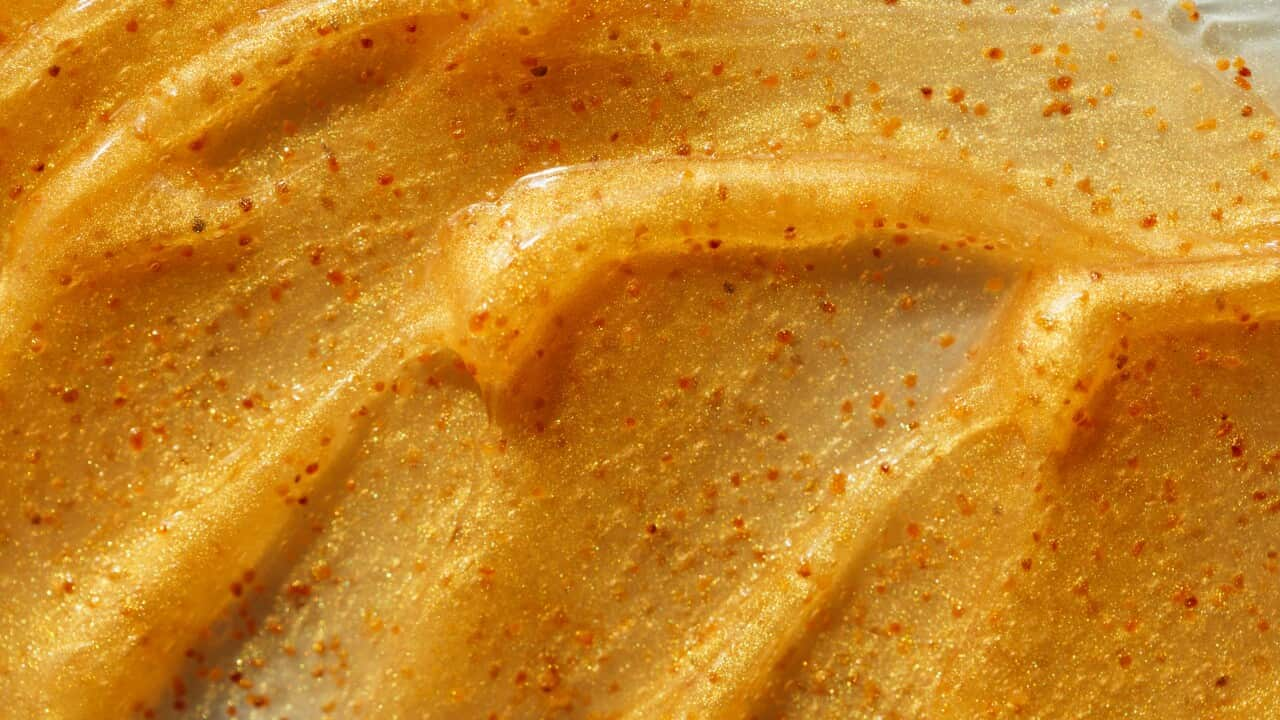Six skincare brands have been ordered to withdraw their products from shelves across NSW after being found to contain microbeads — tiny plastic particles banned under state law.
The NSW Environment Protection Authority (EPA) has issued compliance notices to six companies, including Coles Group and Natio, ordering them to stop supplying the products.
One expert says the finding is a sign that "stronger" government regulation is needed to outlaw microbeads, particularly on a federal level.
Another worries that inconsistent bans and definitions mean consumers could still be exposed to microbeads, even in everyday items like toothpaste.
What products have been pulled from shelves?
Six beauty brands have been ordered to pull their products from NSW shelves after it was found they contained microbeads, which have been banned in the state since 2022.
The brands (across eight products) are:
- Aesthetics Skincare Pty Ltd — Aesthetics Bio Fermented Triple Action Scrub
- Coles Group Ltd — KOi For Men Cleansing Face Scrub Oat & Desert Lime
- Frostbland Pty Ltd — Alya Skin Pomegranate Exfoliator Facial Scrub and Exfoliating Sorbet
- JMSR Australia Pty Ltd — Jan Marini Bioglycolic Resurfacing Body Scrub and Jan Marini Cranberry Orange Exfoliator
- McPherson’s Consumer Products Pty Ltd — Dr LeWinn’s Essentials Gentle Exfoliant Weekly Facial Polishing Gel
- Natio Pty Ltd — Natio Men’s Purifying Face Scrub and Natio Ageless Skin Renewal Exfoliator

NSW EPA CEO Tony Chappel said microbeads come at a significant environmental cost and said they "don't belong in skincare or our waterways", adding that they can "threaten marine life and people's health".
Chappel said several of the banned items used "bioplastics such as polylactic acid (PLA) and cellulose acetate", both bioplastics made from natural, renewable sources. However, Chappel said they "don't readily break down in the environment and are still defined as plastic" under NSW's Plastic Reduction and Circular Economy Act 2021.
He added that companies were quick to remove the product from shelves once notified and that the EPA was working with major retailers, including Chemist Warehouse and Priceline, to get affected products off shelves.
But the order only extends within NSW — meaning some of the same products can still be sold elsewhere in Australia.
What are microbeads and why are they banned?
Microbeads are tiny pieces of plastic used in cosmetics and personal care products, usually for exfoliation.
They were once common in cosmetics and personal care products to add texture, exfoliate or extend shelf life.
Because they aren't biodegradable, when they're washed down drains and enter waterways, they can be ingested by fish and other marine life.
Tara Jones from the Australian Marine Conservation Society says microplastics like microbeads are a "huge problem" for the ocean and its wildlife.
"Microplastics are almost impossible to remove once they enter the environment," Jones told SBS News. "These microplastics don't disappear once they're washed down the drain — they persist in the environment, continuing to harm marine animals and plants."
"Animals of all sizes ingest microplastics, from tiny plankton to whales."
They're also turning up inside human bodies, something that worries Dr Karen Raubenheimer, a senior lecturer at the University of Wollongong.
"Whenever we look in the body and the environment, we find microplastics," Raubenheimer told SBS News. "Different shapes of microplastics seem to collect in different places — including the gut and brain."
She said the plastics themselves can cause harm, but they can also leach chemicals absorbed from the products they're in. "It's not just an environmental thing, it's a human health thing. It's water quality, food security, it's all in the soils," she said.
A patchwork of bans
Australia doesn't have a national ban on microbeads.
Instead, several states and territories have implemented their own rules targeting "rinse-off" personal care products — such as face scrubs and body washes — as part of broader single-use plastic restrictions.
Rinse-off microbeads are banned in:
- NSW (since November 2022)
- ACT (since July 2023)
- WA (since September 2023)
- QLD (since September 2023)
The Northern Territory has also proposed banning rinse-off microplastic products, set to be implemented in 2025.
Victoria, South Australia, and Tasmania have not outlawed microbeads.
Jones said that while a voluntary phase-out of microbeads in rinse-off products had been "quite successful", the EPA's recent enforcement shows a need for "stronger government regulation".
She said identifying microbeads can also be difficult for consumers: "Customers shouldn't need a degree in polymer science to know whether the product they're using has plastic intentionally added to it."

Why regulation remains murky
Raubenheimer said the current bans are narrow in scope and inconsistently applied.
She explained that most state bans only apply to "rinse-off" products, which leaves room for interpretation. "Toothpaste could be interpreted as a rinse-off product because you rinse your mouth," she said.
Microbeads can also be found in products like sunscreens, makeup and glitter, which often fall outside the definitions used in current bans.
Raubenheimer said this patchwork approach makes it difficult for industry to comply. "If it's in one state and not the other, often these products creep across the border. It's very hard to police," she said.
She added that more transparency is needed: "For us on plastics, it's all about disclosure and traceability. Every time you regulate something, you're almost legitimising something that falls outside of that definition or that regulation, so trying to get them to disclose what's in the property is key so that we can track things."
Jones said while the current bans were a "great start", more needed to be done.
"Banning intentionally-added microplastics in rinse-off personal care is a great start, but there are so many other products that contain microbeads that don't fit this category — cleaning products, makeup, moisturisers and deodorants often have microplastics in them, but these aren't covered by the state bans or voluntary phase-out," she said.
How to check if a product has microbeads
To figure out if a product has microplastics in it, you'll need to look at the ingredients list.
Common microbead ingredients include:
- Polyethylene (PE)
- Polyethylene terephthalate (PET)
- Polypropylene (PP)
- Polymethyl methacrylate (PMMA)
- Nylon (PA)
You can also download the Beat the Microbead app, which allows you to scan a product's barcode to see if it contains microbeads.
For the latest from SBS News, download our app and subscribe to our newsletter.

